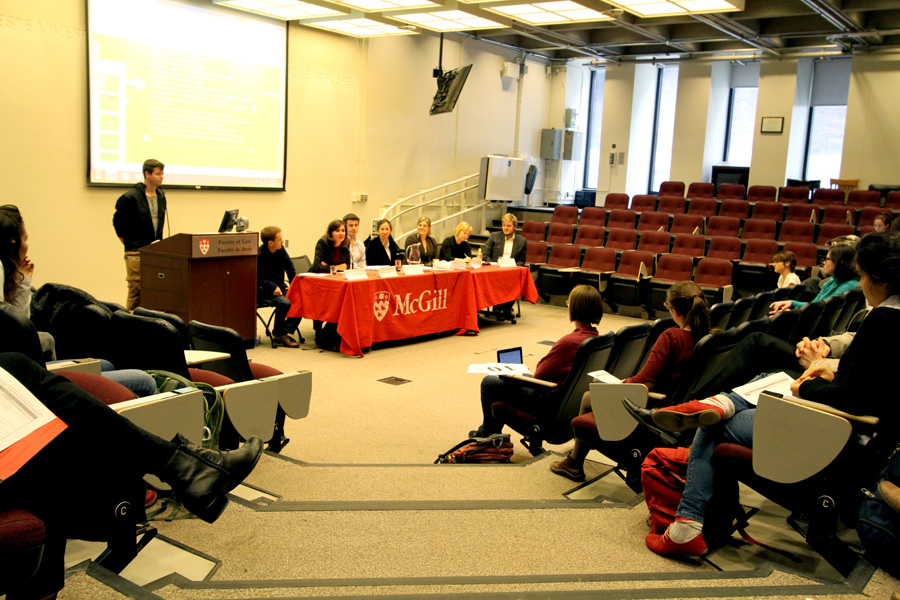Undergraduate law students working as interns in legal clinics and Teaching Assistants (TAs) at McGill are asking to receive monetary compensation for their work.
A town hall was hosted by the Faculty of Law on Wednesday to address the current lack of procedural framework, raise awareness, and brainstorm solutions to the situation.
Currently, undergraduate law students with internships in legal clinics and teaching assistantships at McGill receive academic credit. However, unlike graduates, they are not paid for their work.
Katie Spillane, organizer of the event, said that coordination of the town hall was prompted by her work as the coordinator of the Legal Clinic Course, which allows upper year students to intern at local legal clinics. In these internship positions, students provide assistance and legal advice in exchange for academic credit—but no pay—even though students in the course often work hours exceeding their credit requirements.
“Some students have a requirement of 200 hours for their credits, but at the organisation they’re working four or five hundred hours,” she said. “Should they be able to get paid for those excess hours?”
Daniel Wilband, a third-year law student and a panelist at the event, said student work is particularly vulnerable to “exploitation.”
“Student labour is an interesting phenomenon because sometimes it isn’t clear who’s really benefiting most from the work,” Wilband said. “Ideally, if it’s unpaid or for-credit work, it’s just a great educational experience for the student. But it’s also possible that the opportunity to use cheap or free student labour can be abused, especially in a time of austerity and budget cuts.”
Olivier Jarda, a second-year law student, said that students face other issues due to the highly competitive nature of these positions.
“We have to compete so hard for these positions so we take what we can get,” Jarda said. “And the moment we actually get these positions […] we’re not unionized so we don’t have that institutional gravitas to fight for our rights collectively.”
Undergraduate students enrolled in and working at the Legal Clinic Course are not considered employees by McGill. Olivier Jarda, a second-year law student, said that students face other issues due to the highly competitive nature of these positions.
“We have to compete so hard for these positions so we take what we can get,” Jarda said. “And the moment we actually get these positions […] we’re not unionized so we don’t have that institutional gravitas to fight for our rights collectively.”
The Association of Graduate Students Employed at McGill (AGSEM) is an example of a union, which represents graduate student employees in matters such as compensation.
Jamie Burnett, an invigilator grievance officer at AGSEM, said the association is looking to expand its coverage to undergraduate workers, but the legal process is complicated and time-consuming.
“Our collective agreement with McGill defines the position of a TA to be a graduate student,” Burnett said. “We don’t think that makes sense [….] A lot of people who were doing work that was similar or identical to the [paid] work that was being done by graduate teaching assistants either had a different job title or were undergraduate students. It’s not exactly clear how the situation can be resolved.”
Sean Cory, president of the Association of McGill University Research Employees (AMURE), stressed the importance for both students and employers to be aware of salary standards and rates of compensation outside of the university.
“The first step is to know your rights and to be as informed as possible,” Cory said. “[Professors] will have committee after committee that will look at how they’re compensated [….] That doesn’t happen for students [and] a part of that is just [because] supervisors might not know what the standard is for salaries.”
Mark Phillips, third-year law, said unpaid student work is a “huge problem” that needs to be addressed.
“It’s crucial that we organize to make sure the faculty and university are places for accessible, safe, and dignified study and work,” he said.








Dear Tribune,
“Undergraduate students working as TAs and enrolled in the Legal Clinic Course are not considered employees due to McGill’s labour agreement with the Association of Graduate Students Employed at McGill (AGSEM). Since the union only represents graduate students, undergraduate students like those in the Faculty of Law have less negotiating power over salaries and academic credit received for work.”
The above statement, from your article, is factually incorrect, and I hope you will issue a correction as soon as possible, because it is a pretty heavy statement to make, and is entirely misleading.
AGSEM’s collective agreement is not the reason why undergraduate students working as TAs and at the Legal Clinic are not considered employees; McGill is the reason why undergraduate students in Law are not paid: McGill chooses not to pay them. If you had investigated this story at all, you would notice that there are many undergraduate students in other faculties who work and are paid, including those working as teaching support. AGSEM has never advocated for McGill to not pay individuals who are working, nor is there any section in our agreement which would be used to justify not paying people who are working.
AGSEM represents graduate students and not undergraduate students, undergraduate students can be employees if McGill wants to hire them as employees, they just won’t be union members of AGSEM because they were not included in the unionization drive 20 years ago. AGSEM would be more than happy to include them in our union, which, as you pointed out would give them more bargaining power.
I look forward to seeing your article corrected to reflect factual information as soon as possible.
Regards,
Sunci Avlijas
[email protected]
AGSEM TA Bargaining Committee Officer
Wow, I was at this town hall and that’s not what the law students were necessarily asking for at all. The author shows little understanding of what went on at the meeting. It was much more complex than this. Was she actually listening?